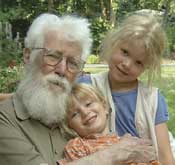Thomas M. Donahue, one of the nation’s leading space and planetary scientists and a pioneer of space exploration, died Oct. 16 from complications following heart surgery. He was 83.

Donahue, the Edward H. White II Distinguished University Professor of Planetary Science, shaped space exploration through his scientific achievements and policy positions. His work started with the first use of sounding rockets following World War II, and his influence continued to the space probes currently exploring the solar system.
Born in Healdton, Okla., on May 23, 1921, Donahue grew up in Kansas City, Mo., graduating from Rockhurst College in that city with degrees in both classics and physics in 1942. His graduate work in physics at the Johns Hopkins University was interrupted in 1944-45 by service in the Signal Corps of the Army of the United States. He obtained his doctorate in atomic physics from Hopkins in fall 1947.
After three years as a postdoctoral research associate and assistant professor at Hopkins, Donahue joined the University of Pittsburgh Physics Department in 1951. There, he organized an atomic physics and atmospheric science program that led to experimental and theoretical studies of the upper atmosphere of the Earth and other planets of the solar system with instruments flown on sounding rockets and spacecraft. He became professor of physics in 1959 and eventually director of the Laboratory for Atmospheric and Space Sciences and the Space Research Coordination Center at the university.
In 1960 he spent a sabbatical year on a Guggenheim Fellowship at the Service d’Aeronomie in Paris and had numerous appointments as visiting professor at the University of Paris after that, forming a collaboration with French colleagues that flourished for more than 40 years.
In 1974 he joined U-M as chairman of the Department of Atmospheric and Oceanic Science, a position he held until 1980. At the time of his death, Donahue held emeritus appointments in the Department of Atmospheric, Oceanic and Space Sciences and the Department of Physics.
In 1986, he was named the Henry Russel lecturer—one of the highest honors the University confers on a faculty member. He received the Atwood Award for excellence in research in 1994.
Elected to the National Academy of Sciences (NAS) in 1983 and to the International Academy of Astronautics in 1986, Donahue was a fellow of the American Geophysical Union and the American Association for the Advancement of Science, and received an honorary degree of Sc.D. from Rockhurst College in 1981. The same year he was awarded the Arctowski Medal by the National Academy of Sciences and the John Adam Fleming Medal by the American Geophysical Union.
He received the NASA Distinguished Public Service Medal, two NASA Public Service Awards, the Space Science Award of the American Institute of Aeronautics and Astronautics, and the National Space Club Science Award.
From 1982-88, he was chairman of the Space Science Board of the National Research Council (NRC) of NAS, where he was a strong advocate for unmanned space science missions within the federal space budget. He also served on numerous governmental, NRC and NAS advisory boards and committees, and was an officer on the boards of several university consortia, such as the University Corporation for Atmospheric Research and the Universities Space Research Association.
He recently served terms as chairman of the Visiting Committee for the Space Telescope Science Institute, the Arecibo Advisory Board and Visiting Committee, the Max Planck Institute for Aeronomy, and the Committee to Visit the Department of Earth and Planetary Sciences at Harvard University. He was chairman of the Committee on Public Policy of the American Geophysical Union and authored more than 200 research publications.
Donahue’s participation in space exploration was influential over many decades and on diverse projects. He was an experimenter or interdisciplinary scientist on the orbiting Geophysical Observatory Missions, Apollo-17, Apollo-Soyuz, Voyager, Pioneer Venus Multiprobe and Orbiter (of which he served as the Science Steering Group chair), Galileo, Comet Rendezvous Asteroid Flyby, and Cassini.
Based on observations by the Pioneer Venus entry probe, he concluded that Venus once had an ocean before a runaway greenhouse effect led it to its current state. Analyzing similar data from Martian meteorites, he again argued for a substantial Martian ocean, anticipating the current series of missions to Mars. In these and many other cases he laid the foundation for our current understanding of planetary atmospheres.
Throughout his life Donahue retained a keen interest in the history of his family in Ireland, as his mother and grandfather both emigrated from County Kerry. He studied both oral and written sources, writing as early as 1942 on the family and the early history of the EU+00C3U+00B3ghanachta Rathleinn. Recently his efforts supported Rod O’Donoghue and others in establishing the international O’Donoghue Society (http://www.odonoghue.co.uk), in particular spearheading a Y-DNA project that continues to reveal fresh details about family migrations from the times of the High Kings to the Cromwellian period.
Donahue brought his powerful intellect and drive to a broad range of lifelong passions beyond science. He was widely read in American, Irish and French history and literature, as well as an exacting student of French wine. He was fluent in several languages, ranging from classical Greek to modern Irish. He had a great love of classical and folk music, singing to his children and grandchildren hundreds of songs, employing keys known only to himself. He also was devoted to tennis, gardening, birding and the outdoors.
He is survived by his wife of 54 years, Esther McPherson Donahue of Ann Arbor; their three sons: Brian of Boston, Kevin of Berkeley, Calif., and Neil of Pittsburgh; six grandchildren; and a brother, Robert Donahue, and sister, Mary Marshall, both of Missouri.

